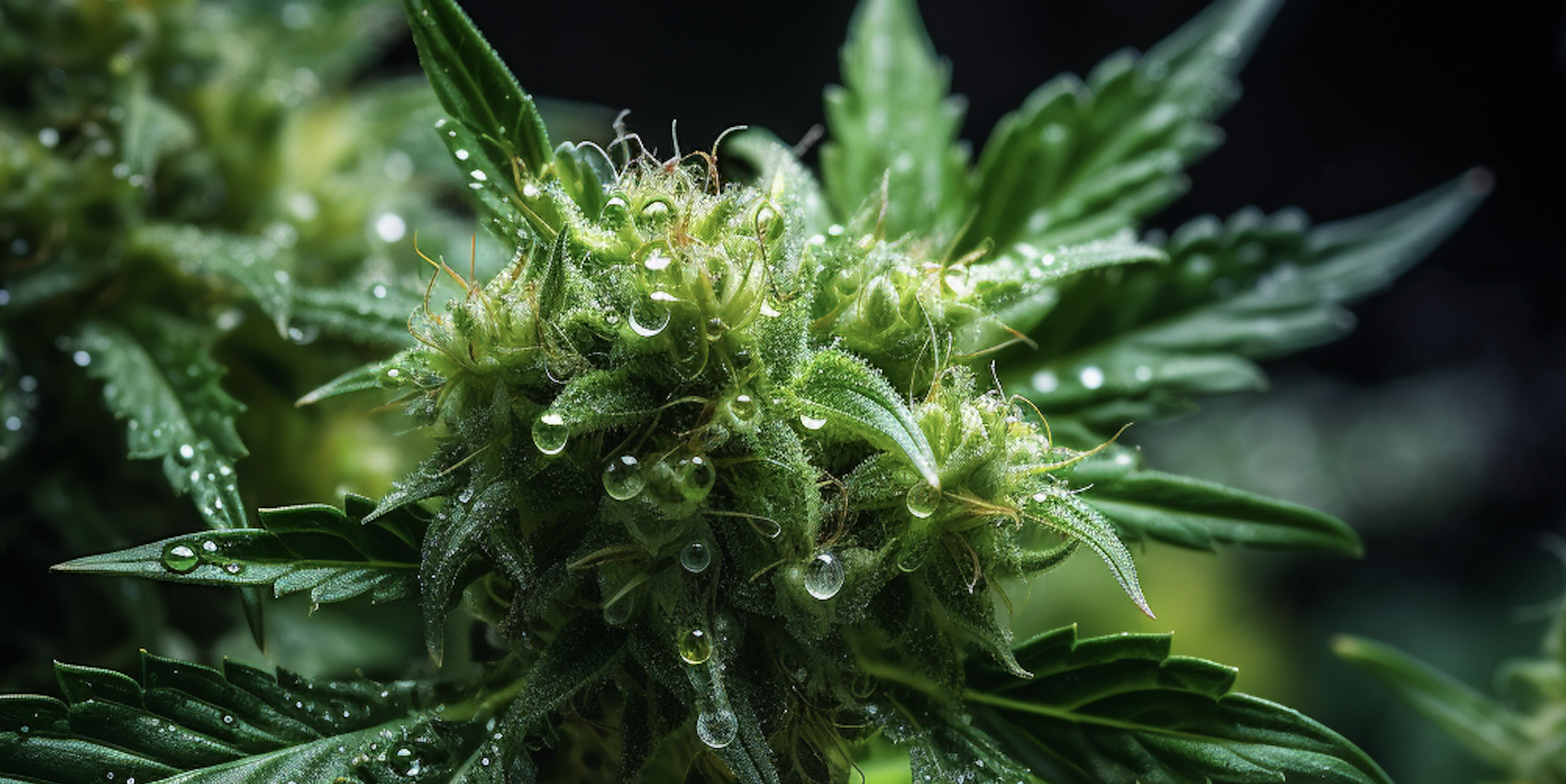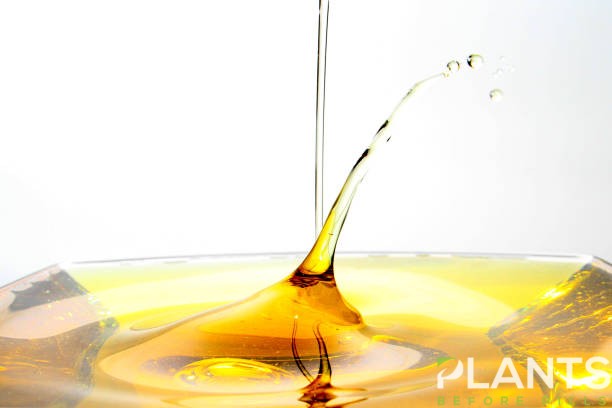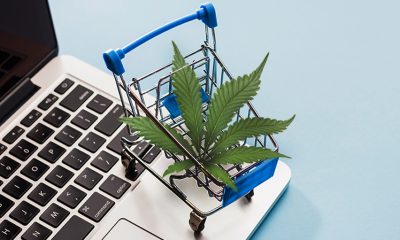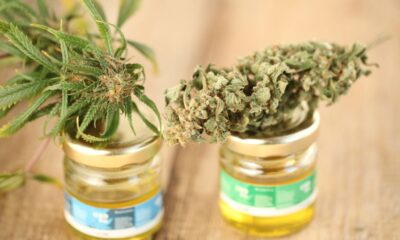Cannabis 101
Exploring the Benefits of THCA Flower, its Uses, and Potential For Improving Your Health

In the realm of cannabis, there is a growing interest in the benefits of THCA flower and its potential for improving health. As science and research continue to push the boundaries, we are discovering that this cannabinoid possesses unique properties that set it apart from its better-known counterpart, THC.
THCA, or tetrahydrocannabinolic acid, is the raw, non-psychoactive form of THC found in cannabis. While THC is known for its mind-altering effects, THCA offers a host of potential therapeutic benefits without the psychoactive high. From relieving inflammation and pain to potentially assisting with neurological disorders and cancer treatment, the uses of THCA are vast and promising.
This article explores the benefits of THCA flower, taking an in-depth look at its potential health enhancements. We will delve into its uses, examining the latest research and anecdotal evidence surrounding this powerful cannabinoid. Whether you’re a seasoned cannabis enthusiast or a newcomer seeking alternative medicine options, this article aims to provide you with valuable insights into the potential benefits of THCA flower. Let’s unlock its full potential together.
What is THCA?
THCA, or tetrahydrocannabinolic acid, is a naturally occurring compound found in the cannabis plant. As the acidic precursor to THC, THCA is predominantly found in raw cannabis and is responsible for many of the plant’s therapeutic properties. Unlike its more famous counterpart THC, THCA is non-psychoactive, meaning it doesn’t produce the euphoric “high” typically associated with cannabis use. This unique characteristic makes it appealing for those seeking the potential benefits of cannabis without the intoxicating effects.
In its natural state, THCA is found in the trichomes of the cannabis flower, where it plays a vital role in the plant’s defense mechanism against pests and environmental stressors. As the plant matures and undergoes a process called decarboxylation—typically through heat or prolonged exposure to light—THCA transforms into THC. This transformation is crucial for users looking to experience the psychoactive effects of cannabis, but it also means that those who prefer to consume cannabis in its raw form will benefit from THCA’s therapeutic properties.
The increasing interest in THCA is a reflection of the broader trend towards understanding cannabis as a complex medicinal plant. Researchers and health advocates are delving deeper into its potential benefits, revealing a promising array of applications in health and wellness. As more people seek natural alternatives to pharmaceutical interventions, THCA is gaining recognition as a valuable component of holistic health strategies.
The difference between THCA and THC
The primary difference between THC vs THCA lies in their chemical structures and resulting effects on the human body. While both compounds originate from the cannabis plant, THCA remains in its acidic form until it undergoes decarboxylation. This conversion alters its molecular structure, resulting in the psychoactive compound THC. This distinction is significant for consumers, as the effects associated with each cannabinoid are markedly different.
THC is well-known for its psychoactive properties, which can induce feelings of euphoria, relaxation, and altered sensory perceptions. This makes THC a popular choice for recreational users seeking a mind-altering experience. Conversely, THCA does not produce these effects, allowing individuals to enjoy the potential benefits of cannabis without the high. This makes THCA particularly attractive for those who want to avoid the psychoactive experience while still reaping the therapeutic rewards associated with cannabis.
Additionally, the therapeutic properties of these cannabinoids also differ. Research suggests that THCA may have various health benefits, such as anti-inflammatory, neuroprotective, and antiemetic effects. While THC is also recognized for its potential therapeutic properties, including pain relief and appetite stimulation, its psychoactive nature may limit its use for certain individuals or conditions. Understanding these differences is crucial for anyone considering the use of cannabis for health improvement, as it allows them to make informed choices based on their unique needs and preferences.
The potential health benefits of THCA
The potential health benefits of THCA are vast and varied, making it a focus of interest for researchers and health enthusiasts alike. One of the most notable properties of THCA is its anti-inflammatory effects. Chronic inflammation is linked to a wide range of health issues such as arthritis, heart disease, and even cancer. Preliminary studies suggest that THCA may help reduce inflammation in the body, thereby alleviating symptoms associated with these conditions and improving overall health.
Another area where THCA shows promise is in its neuroprotective properties. Research indicates that THCA may protect brain cells from damage, potentially offering benefits for neurodegenerative diseases such as Alzheimer’s and Parkinson’s. By mitigating oxidative stress and inflammation in the brain, THCA could play a role in slowing the progression of these debilitating conditions, providing hope for those affected and their families.
Additionally, THCA has been studied for its antiemetic effects, particularly in relation to nausea and vomiting caused by chemotherapy treatments. Many cancer patients experience debilitating nausea, which can severely impact their quality of life. Early research suggests that THCA may help alleviate these symptoms, providing a more comfortable experience for those undergoing treatment. As a result, THCA presents an exciting avenue for supporting cancer patients in their journey toward recovery.
How to use THCA flower for health improvement
Using THCA flower for health improvement is an accessible option for those interested in incorporating this cannabinoid into their wellness routines. The most common method is through raw cannabis flower consumption, which can be enjoyed in various forms. One of the simplest ways to utilize THCA flower is by consuming it in its raw state, either by juicing or adding it to smoothies. This method preserves the integrity of the compound, allowing users to reap the full benefits without the need for decarboxylation.
Another popular method is to create tinctures or oils using THCA flower. This process involves soaking the raw flower in a carrier oil, such as coconut or olive oil, to extract the beneficial compounds. Once prepared, the tincture can be taken sublingually or added to food or beverages. This method allows for precise dosing and can be easily incorporated into daily routines, making it a convenient option for those seeking health benefits from THCA.
For those who prefer a more traditional approach, THCA can also be consumed through capsules made from raw cannabis flower. This method offers a discreet and convenient way to incorporate THCA into your daily regimen. However, it’s essential to ensure that the capsules are made from high-quality raw cannabis to retain the beneficial properties of THCA. Regardless of the chosen method, it’s crucial to start with a low dose and gradually increase it, monitoring how your body responds to find the optimal amount for your individual needs.
The potential side effects of THCA flower
While THCA is generally regarded as safe, it is essential to acknowledge that some individuals may experience side effects. One primary concern is the possibility of gastrointestinal discomfort, particularly when consuming raw cannabis products. Some users report experiencing nausea, diarrhea, or stomach cramps after ingesting THCA in large quantities. Therefore, it is advisable to start with small doses and monitor your body’s response before gradually increasing the amount consumed.
Another potential side effect of THCA flower is its interaction with certain medications. As with any cannabinoid, there is a risk that THCA may interact with prescription medications, affecting their efficacy or leading to unintended effects. This is particularly relevant for medications metabolized by the liver, as cannabinoids can influence liver enzyme activity. It is crucial to consult with a healthcare professional before incorporating THCA into your routine, especially if you are taking other medications or have underlying health conditions.
Lastly, while THCA is non-psychoactive, it is still important to be cautious about its use, particularly in contexts where cannabis consumption is not legal or socially accepted. Individuals should be mindful of local laws and regulations regarding cannabis use. Overall, while the potential side effects of THCA flower are minimal compared to those of THC, it remains essential to approach its use thoughtfully and responsibly.
Where to find high-quality THCA flower
Finding high-quality THCA flower can be a challenge, especially as interest in this cannabinoid continues to grow. The best place to start is by seeking out reputable dispensaries or suppliers that specialize in cannabis products. Many dispensaries now offer raw cannabis products, including THCA flower, and can provide information about the strain’s cannabinoid profile and cultivation practices. When purchasing from a dispensary, always inquire about lab testing to ensure that the product is free of contaminants and accurately labeled.
Online retailers have also emerged as a popular option for sourcing high-quality THCA flower. When purchasing online, it’s crucial to do your research and choose a company with a solid reputation. Look for retailers that provide detailed information about their products, including lab test results and customer reviews. This transparency is vital in ensuring that you are receiving a high-quality product that meets your health needs.
Additionally, consider exploring local cannabis farms or co-ops that focus on organic and sustainable cultivation practices. Many small-scale growers are passionate about their craft and offer high-quality, hand-cultivated THCA flower. Building a relationship with local growers can also provide valuable insights into the different strains available and their associated benefits, allowing you to make informed choices tailored to your individual health goals.
Tips for incorporating THCA flower into your wellness routine
Incorporating THCA flower into your wellness routine can be a rewarding endeavor, but it’s essential to approach it thoughtfully. One of the best ways to start is by understanding your health goals and identifying how THCA can fit into your lifestyle. Whether you are seeking relief from inflammation, looking to support brain health, or simply exploring natural wellness options, having a clear intention can guide your journey with THCA flower.
A practical tip for integrating THCA flower into your routine is to create a daily ritual around its use. This could involve adding raw cannabis to your morning smoothie, making a tincture to use throughout the day, or simply enjoying the experience of consuming THCA flower in its natural form. Establishing a routine not only helps you remain consistent but can also enhance the overall experience by fostering mindfulness and connection with the plant.
Finally, it’s crucial to listen to your body and adjust your approach as needed. Everyone’s response to cannabinoids can vary, so it’s essential to pay attention to how you feel after consuming THCA flower. If you experience any discomfort or adverse effects, consider modifying the dosage or method of consumption. Engaging in open conversations with healthcare professionals knowledgeable about cannabis can also provide valuable guidance as you explore the benefits of THCA flower in your wellness routine.
Legal considerations for using THCA flower
Navigating the legal landscape surrounding THCA flower can be complex, given the varying laws and regulations across different regions. In many places, cannabis remains classified as a controlled substance, even when considering its non-psychoactive components like THCA. Therefore, it is essential to understand local laws before purchasing or using THCA flower. Researching your state or country’s cannabis regulations can provide clarity on what is permissible.
In some jurisdictions, raw cannabis products, including THCA flower, may be legal for medicinal purposes, while recreational use might still be prohibited. For those interested in using THCA for health improvement, obtaining a medical cannabis card may be necessary. This often requires a consultation with a healthcare professional who can assess your health needs and determine whether cannabis is a suitable option for your treatment plan.
Furthermore, even in regions where cannabis is legal, it is important to be aware of regulations regarding possession limits, cultivation, and distribution. Keeping informed about changes in legislation is crucial, as laws surrounding cannabis are continually evolving. By staying educated on these legal considerations, you can ensure that your use of THCA flower remains compliant with local regulations.
Conclusion
As interest in the potential health benefits of THCA flower continues to grow, it is essential to approach its use thoughtfully and informed. This unique cannabinoid offers a range of therapeutic properties without the psychoactive effects associated with THC, making it an attractive option for many individuals seeking natural remedies. From its anti-inflammatory and neuroprotective benefits to its potential role in alleviating cancer-related symptoms, the applications of THCA are vast and promising.
However, as with any health intervention, it is crucial to consult with healthcare professionals before incorporating THCA into your wellness routine. Understanding the differences between THCA and THC, navigating legal considerations, and sourcing high-quality products are all vital steps in making the most of this powerful cannabinoid. By doing so, you can unlock the full potential of THCA flower and discover how it may support your journey toward improved health and well-being.
In conclusion, the exploration of THCA flower presents an exciting frontier in the realm of cannabis research and health. With ongoing studies and increasing interest, the future looks bright for this non-psychoactive cannabinoid. Whether you are a seasoned cannabis user or new to the world of cannabinoids, THCA flower may offer a unique and beneficial addition to your health and wellness journey. Embrace the possibilities, and consider how this remarkable compound can enhance your quality of life.
Medical Disclaimer:
The information provided in these blog posts is intended for general informational and educational purposes only. It is not a substitute for professional medical advice, diagnosis, or treatment. Always seek the advice of your physician or other qualified healthcare provider with any questions you may have regarding a medical condition. The use of any information provided in these blog posts is solely at your own risk. The authors and the website do not recommend or endorse any specific products, treatments, or procedures mentioned. Reliance on any information in these blog posts is solely at your own discretion.
Cannabis 101
Live Resin Explained: A Potent Cannabis Extract Guide

Live resin has gained significant popularity among cannabis enthusiasts in recent years. Known for its rich aroma, flavorful profile, and high potency, this concentrate stands out in the ever-evolving world of cannabis products. As consumer interest continues to grow, many people are curious about what makes resin so unique and how it differs from other cannabis concentrates. This article explores the characteristics, production process, and appeal live resin, along with answering the essential question: how is live resin made?
What is Live Resin?
Live resin is a type of cannabis concentrate that preserves the full spectrum of cannabinoids and terpenes found in the plant. Unlike other extracts that use dried and cured plant material, resin is made from fresh cannabis plants that are frozen immediately after harvest. This preservation technique captures the plant’s full aromatic and psychoactive profile, resulting in a product that more accurately reflects the flavor and effects of the original strain. Its texture can range from a saucy consistency to a more solid, wax-like form, and it often appears golden to amber in color. The aroma is typically stronger and more complex compared to other extracts, making it a favorite among connoisseurs.
The Origins and Rise of Live Resin
Live resin was developed in the early 2010s and quickly rose to prominence due to its superior flavor and potency. The technique was pioneered by a group of cannabis enthusiasts and extract artists who wanted to create a concentrate that retained the fresh plant’s essence. By using flash-freezing methods and special extraction techniques, they discovered a way to preserve the volatile terpenes that are typically lost during the drying and curing process. As word spread about this innovative approach, resin became a sought-after product in dispensaries across legalized markets.
How is Live Resin Made?
To understand the uniqueness of resin, one must explore he answer to the question: how is resin make? The process begins immediately after harvesting the cannabis plant. Instead of going through the traditional drying and curing stages, the plant is freeze at sub-zero temperatures to lock in the natural terpene and cannabinoid profiles. This step is crucial, as it prevents the degradation of the plant’s chemical compounds. The frozen plant material is then subject to a hydrocarbon extraction process, most commonly using butane or propane. These solvents help extract the active ingredients while maintaining the plant’s original terpene structure. The extract is then purged of residual solvents in a vacuum oven at low temperatures to ensure purity and safety. The result is a highly aromatic and potent concentrate that mirrors the plant’s original characteristics. The question of how is live resin made also highlights the technological advancements that make this process possible. Specialized closed-loop extraction systems are use to perform the process safely and efficiently, ensuring that the final product is both high-quality and safe for consumption.
Benefits of Live Resin
One of the most notable advantages of live resin is its terpene retention. Terpenes are the aromatic compounds responsible for the unique smell and taste of each cannabis strain. They also play a crucial role in modulating the effects of cannabinoids, creating what is know as the entourage effect. By preserving these compounds, live offers a more holistic cannabis experience. Users often report that the effects of live feel more complete and balanced compared to other concentrates. Additionally, its rich flavor profile enhances the sensory aspect of consumption, making it especially popular among users who value taste and aroma. Medical patients may also benefit from the therapeutic properties of the preserved terpenes, which can contribute to effects like stress relief, anti-inflammation, and improved mood.
Comparing Live Resin to Other Concentrates
Live resin differs significantly from other cannabis extracts such as shatter, wax, or distillate. While those products often prioritize potency and shelf stability, they typically sacrifice flavor and aromatic complexity due to the high heat and processing involved. In contrast, resin’s production process is focus on preserving the plant’s natural compounds. This makes it a more flavorful and potentially more effective option for those seeking the full benefits of the cannabis plant. When asking how is resin make, it becomes clear that the process is not only more labor-intensive. But also more technologically demanding, which contributes to its higher price point in the market.
How to Consume Live Resin
There are several methods for consuming live resin, depending on personal preference and desired effects. Dabbing is the most popular method, involving the vaporization of the concentrate using a dab rig or e-nail. This method allows users to experience the full flavor and potency of the product. It can also be add to joints, bowls, or vaporizers for enhanced effects. Because of its strength, new users are advise to start with small amounts and gradually increase their dosage. The consistency of live resin may require specialized tools for handling, such as dabbers or concentrate scoops. To avoid waste and ensure proper dosing.
The Future of Live Resin in the Cannabis Industry
As the cannabis industry continues to evolve, live resin is poise to remain a premium product in dispensaries. Innovations in extraction technology and increased consumer awareness are likely to drive further interest in this concentrate. More producers are investing in quality cultivation and freezing methods to meet the growing demand. Furthermore, as scientific understanding of cannabinoids and terpenes advances, resin may play a significant role in personalized cannabis therapies. As people continue to ask how is live resin make, the answer will evolve. With the development of even more precise and efficient extraction technique.
Final Thoughts
Live resin stands out as one of the most flavorful and potent cannabis concentrates available today. Its unique production method, which starts with flash-freezing fresh plants and continues through meticulous. Extraction, results in a product that captures the full essence of the cannabis plant. By answering the question of how is live resin make. Consumers gain a deeper appreciation for the craftsmanship involve in producing such a high-quality concentrate. Whether for recreational enjoyment or medical use, live resin offers a dynamic and full-bodied experience. That sets it apart in the world of cannabis extracts.
Medical Disclaimer:
The information provided in these blog posts is intended for general informational and educational purposes only. It is not a substitute for professional medical advice, diagnosis, or treatment. Always seek the advice of your physician or other qualified healthcare provider with any questions you may have regarding a medical condition. The use of any information provided in these blog posts is solely at your own risk. The authors and the website do not recommend or endorse any specific products, treatments, or procedures mentioned. Reliance on any information in these blog posts is solely at your own discretion.
Cannabis Business
Benefits of Partnering with a Cannabis POS Provider

Cannabis dispensaries in the U.S. operate in a fast-growing, highly regulated market. With nearly 15,000 dispensaries nationwide, owners face challenges such as strict compliance rules, complex inventory management, and delivering exceptional customer experiences. Partnering with a dedicated cannabis point-of-sale (POS) provider can help meet these challenges. Below we outline key benefits – from compliance and inventory control to analytics, CRM, efficiency, security, and scalable growth.
Compliance with State Regulations
Cannabis sales are highly regulated, making compliance support a top benefit of a specialized POS. The system can automatically enforce purchase limits, verify customer IDs, and generate required state reports. By integrating with seed-to-sale tracking systems, a cannabis POS reduces human error and provides an audit trail. This helps protect your license and avoid penalties.
Real-Time Inventory Management
A cannabis-specific POS offers real-time inventory management tailored to dispensaries. Every sale is instantly deducted from inventory, preventing stock discrepancies or overselling. Many systems sync with state traceability programs to maintain precise records and live menu updates. These tools ensure you never run out of product during business hours.
Reporting and Analytics
Because the POS consolidates all sales and inventory data, it provides robust reporting and analytics. Managers can quickly pull reports on sales trends or product performance and spot patterns at a glance. These data-driven insights (like identifying peak sales times or top-selling products) inform smarter decisions about staffing, stocking, and marketing.
Sales and CRM Tools
Many cannabis POS solutions include built-in CRM tools that enhance sales and customer retention. The system records each customer’s purchase history and preferences, enabling targeted promotions and personalized recommendations. Integrated loyalty programs reward repeat customers and drive return visits.
Streamlined Operations and Efficiency
Working with a cannabis-focused POS provider helps streamline operations. The platform automates routine tasks – updating inventory counts, applying correct taxes, logging compliance data – so staff spend less time on paperwork and more with customers. Reducing manual data entry and errors through automation leads to higher productivity and a smoother-running store.
Secure Payments and Data Protection
Security is another advantage of partnering with a cannabis POS company. Advanced POS systems use encrypted transactions, user access controls, and secure cloud backups to protect sensitive data. Many integrate with compliant payment solutions (such as cashless ATMs or digital payment gateways) to reduce reliance on cash. The POS also helps prevent fraud and data breaches by tracking all transactions and safeguarding customer information.
Scalability for Growth
Finally, a dedicated cannabis POS sets your business up for scalability. Modern cloud-based systems make it easy to add new stores or sales channels and manage them all from one interface. Owners can oversee multiple locations from a central dashboard, keeping inventory and compliance consistent. In short, the right POS will scale with your growth, making expansion much simpler.
Conclusion
In summary, partnering with a cannabis-specific POS provider gives dispensaries the tools to stay compliant, efficient, and customer-focused. Whether you’re opening a new shop or expanding to multiple locations, you will have an easier time with a cannabis POS system tailored to the industry. Leveraging these specialized solutions streamlines the business and sets the stage for long-term success in a highly regulated market.
Medical Disclaimer:
The information provided in these blog posts is intended for general informational and educational purposes only. It is not a substitute for professional medical advice, diagnosis, or treatment. Always seek the advice of your physician or other qualified healthcare provider with any questions you may have regarding a medical condition. The use of any information provided in these blog posts is solely at your own risk. The authors and the website do not recommend or endorse any specific products, treatments, or procedures mentioned. Reliance on any information in these blog posts is solely at your own discretion.
Cannabis Business
The Evolving World of Cannabis and Recreational Cannabis Shops

Cannabis has traveled a winding path in public perception—from a subject cloaked in taboo to a topic openly debated in legislative halls and around family dinner tables. Today, many regions offer legal avenues for purchasing cannabis, giving rise to a flourishing new industry and consumer culture. Whether your interest is purely curious, medicinal, or recreational, the world of cannabis is as fascinating as it is complex. Below, we’ll explore its historical background, the differences between medical and recreational use, the significance of modern retail establishments (including Illinois dispensaries), and how newcomers might safely and responsibly navigate this evolving landscape.
A Brief History of Cannabis
For thousands of years, humans have used cannabis for various purposes—spiritual ceremonies, medicinal treatments, and even textile production. Ancient civilizations across Asia, the Middle East, and Africa cultivated the plant for its fibers and psychoactive properties. Over centuries, traders carried cannabis seeds along major trade routes, leading to the development of multiple strains and cultivation techniques.
In the early 20th century, shifting social and political viewpoints led to strict prohibitions and criminalization of the plant in many parts of the world. For a long while, research on cannabis was minimal due to restrictive laws, and misconceptions abounded. Fast-forward to recent years, however, and we see a dramatic reevaluation. As studies highlight potential therapeutic benefits of cannabis, legislation in many jurisdictions has adapted—allowing both medical and recreational use under regulated conditions.
Medical vs. Recreational: Understanding the Differences
Medical Use
Cannabis has long been recognized by certain individuals and small communities for its analgesic (pain-relieving), anti-inflammatory, and anti-anxiety properties. Modern science is now catching up, producing a growing body of research exploring how cannabinoids—particularly cannabidiol (CBD) and tetrahydrocannabinol (THC)—affect the human body. Medical cannabis often caters to patients with conditions such as chronic pain, epilepsy, and muscle spasms, among others.
Medical dispensaries (found in regions where cannabis is approved for medicinal use) specialize in strains and products intended to alleviate specific symptoms. For instance, high-CBD strains may help reduce inflammation or seizures without producing a strong psychoactive “high,” while balanced THC-CBD strains might offer both pain relief and mild euphoria. In these settings, staff often consult with licensed healthcare providers to tailor treatment plans for patients, ensuring dosage and strain match the individual’s needs.
Recreational Use
Recreational cannabis, by contrast, places the focus on enjoyment, relaxation, and occasional social use. While many consumers still experience therapeutic benefits—like stress relief or better sleep—when using cannabis recreationally, they typically do not seek formal medical counsel. The product variety in recreational settings is often wider, with everything from the classic dried flower to edibles, tinctures, topicals, concentrates, and beyond.
Consumers gravitate toward recreational cannabis for different reasons. Some enjoy the creativity it can spur, others find it offers stress relief at the end of a long day, and still others appreciate the social bonding aspect of sharing it in a safe setting. Whatever the motivation, the booming recreational market has driven dispensaries and innovators to develop myriad products and potencies to cater to a broad range of preferences.
The Rise of Recreational Cannabis Shops
Accessibility and Community Engagement
The emergence of legal recreational cannabis shops has dramatically changed how people explore and access cannabis products. Modern dispensaries often aim to create welcoming spaces, complete with bright décor and knowledgeable staff (commonly referred to as “budtenders”). These experts help visitors navigate products by discussing the differences between strains, the nuances in potency, and the variety of consumption methods.
In many communities, dispensaries also serve as educational hubs. Public stigma and misinformation around cannabis remain prevalent, so shops may host seminars, workshops, or guest speaker events to demystify topics like responsible use, the difference between CBD and THC, or how local regulations work. By engaging with the community, dispensaries strive to be more than mere retail outlets; they become pillars of a new cannabis culture built on transparency and safety.
The Regulatory Maze
Setting up and operating a recreational cannabis shop is no small endeavor. The rules can shift dramatically even between neighboring jurisdictions, dictating everything from packaging standards to hours of operation and purchase limits. In some areas, THC potency is capped, while in others, high-strength concentrates are freely available. Businesses must invest in security, licensing, and rigorous quality control to comply with these varied regulations.
For consumers, understanding local guidelines is vital—especially for travelers. Purchasing cannabis in one location does not mean it is legal to consume in a neighboring town or state. Legal possession limits also differ widely. In short, when buying or carrying cannabis, knowledge is crucial to avoid crossing any legal line.
Illinois Dispensaries: A Case Study in the Broader Cannabis Landscape
One notable example of evolving cannabis laws can be seen with Illinois dispensaries. Illinois has undergone a sweeping transformation in its relationship with cannabis in a relatively short period. Once subject to strict prohibition, the state now allows regulated sales of both medical and recreational marijuana under specific guidelines. This shift has highlighted how quickly laws can change—and how an industry can blossom almost overnight when demand meets legislative support.
For residents or visitors exploring Illinois dispensaries, the emphasis on safety and education is typically front and center. Many shops offer product information via printed guides or in-person consultations. Customers can learn about everything from strain profiles and THC levels to the potential benefits and drawbacks of various consumption methods. The success of Illinois dispensaries underscores the broader trend: as more states and regions adopt or expand their cannabis policies, dispensaries stand poised to play an even bigger role in public education and access.
Key Considerations for New Consumers
Strains, Potency, and Consumption Methods
If you’re new to cannabis, picking a product can be overwhelming. Dispensaries often categorize products under three primary strain types: indica, sativa, and hybrid. Indica strains are generally reputed to induce relaxation, sativas are often described as uplifting or energizing, and hybrids offer a mix of these effects. However, these labels are broad, and individual responses can vary. The best approach is to start with a low dose and keep track of how you feel.
Consumption methods also influence the overall experience. Smoking or vaping typically yields faster results, while edibles can take more time to kick in—yet they often produce longer-lasting effects. Tinctures, sublingual strips, and topicals (like creams) offer alternative, sometimes more discreet, ways to consume cannabis. Each method has its pros and cons, so experimentation—done responsibly—helps users find what suits them best.
Finding Reliable Information
With cannabis’s surge in popularity, the internet overflows with guides and opinions. It can be difficult to separate fact from fiction. For the most reliable information, look to peer-reviewed studies, verified educational platforms, and medical professionals experienced in cannabis therapeutics. Dispensary staff, particularly in states with regulated markets, often receive formal training about product lines and best practices. Don’t hesitate to ask questions, especially if you’re unsure about effects, dosage, or interactions with other substances (like medications or alcohol).
Myths and Misconceptions
Stigma and Education
Despite the societal shift, many myths linger. One persistent myth is that all cannabis use is dangerous or leads to addiction. While cannabis can be habit-forming for some, the risk often correlates with frequency of use, individual predispositions, and overall context. Another misconception is that high-THC content automatically guarantees a superior experience. In reality, the best cannabis experience is subjective; potency is just one factor among many, including cannabinoid ratio, terpene profile, and personal tolerance.
Education plays a pivotal role in dispelling these myths. Individuals who understand how cannabis affects the endocannabinoid system, how to measure potency, and how to consume responsibly are more likely to have safe and positive experiences. By contrast, ignorance or misinformation can lead to misuse or misunderstanding, further fueling stigma.
The Legal Gray Areas
While many places have legalized medical or recreational cannabis, gray areas persist. In some jurisdictions, personal cultivation is allowed; in others, it’s strictly regulated or entirely banned. Possession limits can differ from local purchase limits, adding another layer of confusion. When crossing state or national borders, even small amounts of legally purchased cannabis can result in serious legal trouble if it’s outlawed on the other side.
Staying up to date on regulations—particularly if you like to travel—is essential. Websites for local departments of public health or dedicated cannabis regulatory bodies typically offer the clearest guidance. By taking a few minutes to do some research, you can save yourself a host of issues and ensure a smooth experience.
Toward a More Informed Future
As cannabis acceptance grows, recreational cannabis shops (and even medical dispensaries) continue to expand, offering new products, experiences, and resources. Whether you’re exploring Illinois dispensaries or curious about other markets, these establishments symbolize a broad cultural change. What was once secretive has become a legitimate industry that not only generates significant tax revenue but also has the potential to empower patients, reduce reliance on unregulated sources, and spark further scientific exploration.
Still, the future of cannabis holds challenges and potential risks. Access must be balanced with awareness. Public health considerations—such as preventing underage consumption and mitigating impaired driving—remain paramount. Researchers are keenly interested in understanding cannabis’s long-term effects on physical and mental health, unearthing both beneficial and adverse outcomes. Concurrently, advocates push for social equity programs to ensure that communities historically penalized for cannabis offenses can now share in the industry’s profits and opportunities.
Yet these hurdles are part of a broader evolution—one that’s redefining not just laws, but also social attitudes, business practices, and healthcare paradigms. The cannabis conversation continues to broaden, encompassing everything from environmental sustainability in cultivation to the nuances of cannabinoid research. With each new discovery, people gain more tools to make informed decisions about whether, why, and how to incorporate cannabis into their lives.
Final Thoughts
Whether you’re drawn to cannabis for therapeutic reasons, curious about the array of products on display at recreational shops, or simply intrigued by the cultural shift, knowledge is your best ally. Take the time to research, talk to qualified professionals, and assess how cannabis might fit into your lifestyle—if at all. From the historical roots of this ancient plant to the modern-day realities of Illinois dispensaries and beyond, cannabis stands at the crossroads of tradition, innovation, and public policy.
As the stigma fades and science progresses, cannabis’s role in society will likely continue to expand in fascinating ways. This is an era of discovery and discourse. Embracing a balanced perspective—one that recognizes both the potential benefits and real risks—is crucial for fostering a responsible cannabis culture. Through open dialogue, ongoing research, and thoughtful legislation, cannabis may ultimately find its place as a tool for relaxation, wellness, and social enjoyment, responsibly integrated into everyday life.
Medical Disclaimer:
The information provided in these blog posts is intended for general informational and educational purposes only. It is not a substitute for professional medical advice, diagnosis, or treatment. Always seek the advice of your physician or other qualified healthcare provider with any questions you may have regarding a medical condition. The use of any information provided in these blog posts is solely at your own risk. The authors and the website do not recommend or endorse any specific products, treatments, or procedures mentioned. Reliance on any information in these blog posts is solely at your own discretion.
-

 Cannabis Recipes5 years ago
Cannabis Recipes5 years agoCBD-Infused Kahlua Cheesecake Tart With Scientist-Turned-Chef Chris Yang | Like A Chef [VIDEO]
-

 Cannabis Business2 years ago
Cannabis Business2 years agoRAW Paper’s Announces Details On Their “Golden Ticket” Sweepstakes
-

 CBD Plants & Strains5 years ago
CBD Plants & Strains5 years agoCan you smoke CBD hemp flower?
-

 Cannabis 1014 years ago
Cannabis 1014 years agoHow to Choose the Best Dispensary in Scottsdale AZ
-

 Cannabis Lifestyle5 years ago
Cannabis Lifestyle5 years agoWhat To Look For When Buying High-Quality CBD Products
-

 Cannabis Blogs4 years ago
Cannabis Blogs4 years agoCBD and Coffee
-

 Cannabis Blogs3 years ago
Cannabis Blogs3 years agoTop CBD Trends in 2022
-

 Cannabis Recipes4 years ago
Cannabis Recipes4 years agoCbd & strawberry vinaigrette




















































